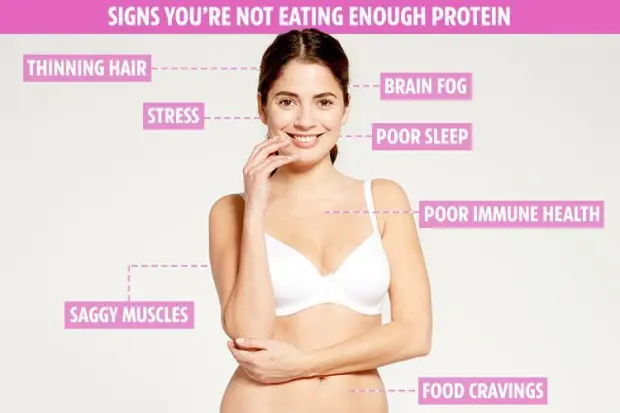
7 Signs You’re Not Getting Enough Protein Every Day
Protein is an essential nutrient that plays a crucial role in your overall health, from building muscles and repairing tissues to supporting immune function and hormone production. Despite its importance, many people unknowingly consume less protein than their bodies require, leading to subtle but impactful health issues.
In this comprehensive guide, we will tell you top 7 signs you’re not getting enough protein every day so you can identify the red flags and take action to improve your diet and well-being.
Why Is Protein Important?
Before diving into the signs of protein deficiency, it’s vital to understand why protein matters. Proteins are made up of amino acids, which are the building blocks for many vital functions in your body:
- Muscle repair and growth
- Enzyme and hormone production
- Immune system support
- Hair, skin, and nail health
- Energy source (when carbs and fats are insufficient)
Without enough protein, your body struggles to perform these functions optimally, which can lead to health problems over time.
How Much Protein Do You Need?
The Recommended Dietary Allowance (RDA) for protein is about 0.8 grams per kilogram of body weight for the average adult, but this can vary based on factors like age, activity level, and health goals. Athletes or those with higher physical demands often require more.
For example:
- Sedentary adult: 46-56 grams per day
- Active adult or athlete: 1.2-2.0 grams per kilogram per day
If you’re not hitting these numbers regularly, you may be at risk of protein deficiency.
7 Signs You’re Not Getting Enough Protein Every Day
Now, let’s identify the common signs that suggest your protein intake might be lacking.
1. Persistent Fatigue and Weakness
Feeling tired or weak despite getting enough sleep can be a sign of inadequate protein intake. Protein provides amino acids necessary for producing hemoglobin, which carries oxygen in your blood. Low protein can lead to reduced oxygen transport and muscle energy, making you feel fatigued.
- Why it happens: Insufficient protein disrupts muscle repair and energy metabolism.
- What to watch for: Feeling unusually exhausted after simple tasks or workouts.
2. Muscle Loss and Weakness
Protein is critical for muscle maintenance. When your body doesn’t get enough protein, it starts breaking down muscle tissue to meet its amino acid needs.
- Why it happens: Your body prioritizes vital functions over muscle preservation.
- What to watch for: Noticeable decrease in muscle mass or strength, frequent muscle cramps, or slow recovery after exercise.
3. Hair, Skin, and Nail Problems
Your hair, skin, and nails are made largely of protein (keratin). Deficiency can cause brittle nails, thinning hair, hair loss, and dry, flaky skin.
- Why it happens: Lack of amino acids impairs protein synthesis needed for healthy skin and hair cells.
- What to watch for: Increased hair shedding, slow nail growth, or changes in skin texture.
4. Increased Hunger and Cravings
Protein is known for its satiating effect. Low protein intake may cause you to feel hungry more often, leading to cravings for unhealthy snacks or carbs.
- Why it happens: Protein helps regulate hormones like ghrelin (hunger hormone) and leptin (satiety hormone).
- What to watch for: Constant hunger even after meals, difficulty controlling cravings.
5. Slow Healing and Frequent Illness
Protein is essential for tissue repair and immune function. A deficiency can delay wound healing and make you more prone to infections.
- Why it happens: Without enough protein, your immune cells and repair mechanisms can’t function efficiently.
- What to watch for: Cuts or bruises that take longer to heal, frequent colds, or other infections.
6. Edema (Swelling)
Swelling in the hands, feet, or abdomen, known as edema, can sometimes be linked to protein deficiency.
- Why it happens: Proteins help regulate fluid balance in your blood vessels. Low protein leads to fluid leakage into tissues.
- What to watch for: Puffiness or swelling that doesn’t seem related to injury.
7. Mood Changes and Brain Fog
Your brain requires amino acids for neurotransmitter production. Low protein intake can impact mood, concentration, and cognitive function.
- Why it happens: Imbalanced neurotransmitters due to lack of amino acids.
- What to watch for: Irritability, depression, difficulty focusing, or mental fatigue.
Other Potential Symptoms of Protein Deficiency
Besides the main seven signs, other less common symptoms include:
- Weak immune response
- Changes in appetite or weight loss
- Hormonal imbalances
- Bone fragility
If you experience a combination of these symptoms, it’s worth evaluating your protein intake.
How to Increase Your Protein Intake
If you recognize these signs and suspect you’re not getting enough protein, here are some practical tips:
Incorporate High-Protein Foods
- Animal sources: Chicken, turkey, beef, pork, fish, eggs, dairy (milk, yogurt, cheese)
- Plant sources: Lentils, chickpeas, beans, quinoa, tofu, tempeh, nuts, seeds
Use Protein Supplements if Needed
Protein powders or bars can help fill gaps, especially for athletes or those with dietary restrictions.
Balance Your Meals
Aim for protein in every meal and snack to maintain steady amino acid supply.
Track Your Intake
Use apps or food diaries to monitor how much protein you consume daily.
Who Is at Risk for Protein Deficiency?
Some groups are more vulnerable:
- Vegetarians and vegans (due to lack of animal protein)
- Older adults (due to decreased appetite and absorption)
- People with chronic illnesses or injuries
- Athletes with high protein needs
- Those on restrictive diets or with eating disorders
When to See a Doctor
If you suspect a severe protein deficiency or have persistent symptoms, consult a healthcare professional. They may perform blood tests or recommend dietary changes and supplements.
Final Thoughts
Protein is fundamental for health, energy, and body function. Being mindful of your protein intake and recognizing early signs of deficiency can help you avoid complications. If you identify any of these 7 signs, consider evaluating your diet and incorporating more protein-rich foods to support your overall wellness.
